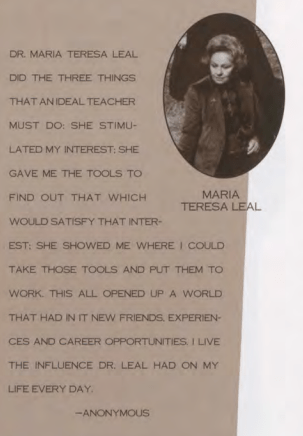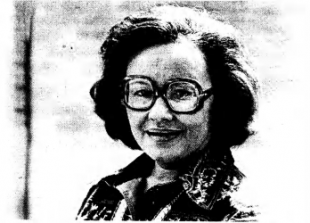María Teresa Leal, a fondly remembered former professor of Spanish and Portuguese credited with transforming students’ lives, died Nov. 30. She was 93.

An anonymous student’s tribute to professor María Teresa Leal from the 1994 Sallyport called her an “ideal teacher.”
The daughter of two professors, Leal hailed from Cajazeiras, Paraíba and was a natural-born teacher. She specialized in medieval Spanish and Latin American literature, particularly from her home country of Brazil.
Leal arrived in Houston in 1960 to teach after earning her bachelor’s degree in 1946 from Pontifícia Universidade Católica in Brazil and traveling widely throughout Latin America and Spain. As she once told the Rice Thresher, Leal made an annual pilgrimage to a different Spanish-speaking country every summer to keep up with their language and trends.
“She changed my life,” said Les Pinter, one of the countless Rice alumni influenced by Leal. After receiving a master’s degree from Rice and pursuing his doctorate, Pinter became a pioneering software developer who sold the source code that was repackaged as Microsoft Word.
“She had encouraged me to apply to the Ph.D. program in economics at Rice, and for all I know, she put in a good word for me,” Pinter said.
Leal began her career at Rice in 1962, where she taught for a year as a visiting lecturer before heading home to complete her doctorate, which she received in 1963 from Universidade Federal do Rio de Janeiro. She returned to Rice in 1965 as a professor and taught until her retirement in 1997, at which time she became a professor emerita.
In 1971, Leal took a sabbatical year to work at the University of Oporto in Portugal. She remained there the following year at the university’s request to inaugurate its new chair in Brazilian literature and serve as chairwoman of its Department of Romance Languages, gaining experience she would put to use at Rice the following decade.
During the 1980s, Leal twice served as chair of the Department of Spanish, Portuguese and Classics, as it was then called. The contemporary Department of Spanish, Portuguese and Latin American Studies still honors Leal with a yearly honors thesis prize and cash award in her name.
In 1985, Leal helped arrange a rendezvous that bridged her two worlds, Latin America and Leal’s adopted home of Houston. One memorable day, she accompanied Peruvian writer and future Nobel Prize winner Mario Vargas Llosa and Fernando Castro, a Peruvian artist and Rice Fulbright Fellow, to the River Oaks home of arts doyenne Dominique de Menil. Castro later recounted the life-changing experience in an essay for Literal Magazine, with a fitting footnote: “After we left Mrs. D’s home we all went to have lunch at a Brazilian restaurant in the Montrose area that María Teresa had recommended.”
In 1987, Leal was made a dame of the Order of Isabella the Catholic, a Spanish civil order in which membership is granted to recognize services that benefit the country. Leal was recognized by King Juan Carlos I for her contributions to Spanish culture and language.

A photo from a 1977 issue of the Rice Thresher shows Professor Leal as a new resident associate of Baker College.
While at Rice, Leal also significantly contributed to on-campus culture, first serving as a Jones College associate from 1970 to 1977. She later became a resident associate at Baker College from 1977 to 1979, a position she loved and would return to after serving as department chair. She was a resident associate at Sid Richardson College from 1987 to 1988 and at Will Rice College from 1988 until 1994.
Shortly after arriving at Rice, Leal attended a Pan American Airways party accompanied by a student from her Spanish and Portuguese classes. True to form, Leal was there to share her Latin American culture, according to the caption on a 1967 press photo from the event: “Rice University’s beautiful Spanish and Portuguese teacher, Dr. Maria Teresa Leal de Martinez, accompanied by Rice student Les Pinter on the guitar, sang ‘The Girl from Ipanema’ and ‘Corcovado.’”
Pinter remembered that Leal encouraged him to become fluent in Portugese, a language he studied as an undergraduate. They met frequently to “bater um papo,” or have informal chats in the language, often playing guitar and singing bossa nova songs together. Leal also pushed Pinter to continue his education.
“María Teresa had a number of projects to provide educational opportunities in her native Bahia, the most economically disadvantaged state in Brazil,” Pinter said. “Years later, when Microsoft sent me on a speaking tour of seven cities including Salvador, the capital of Bahia, I thought of her all the time that I was there. She was a large part of the reason that I was able to give my presentations in Portuguese. I know that there are people there who also benefited from her generosity. I was lucky to have her as a friend and mentor, and I will miss her.”
Pinter added a final message for Leal, in Portugese: “Obrigado de você por tudo, minha irmã.”
“Thank you for everything, my sister.”

